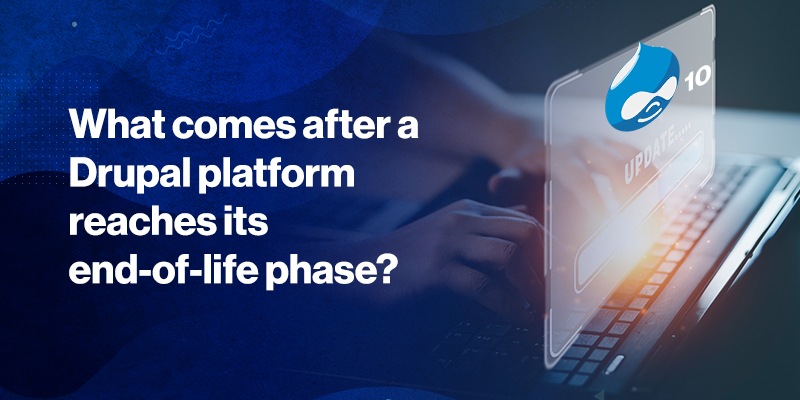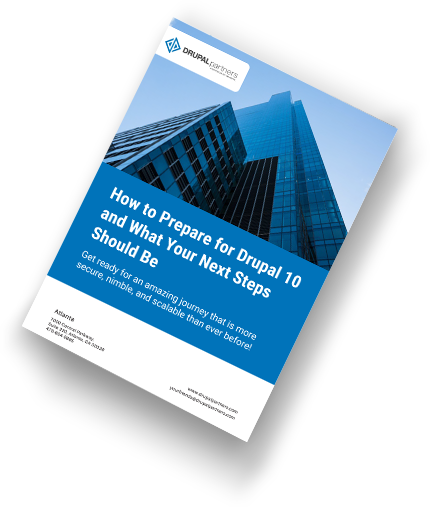What comes after a Drupal platform reaches its end-of-life phase?

Have you experienced the "update available" on your system while at work?
If so, don't ignore it. In fact, if its creators no longer support the software, then that usually means the product has reached an "end-of-life", or EOL status and could be vulnerable to threats.
Continue reading to gain more insights on end-of-life software, upgrade, and tips!
Your Drupal platform is past its expiration date. What now?
Grasping the repercussions of running outdated software and what methods you need to take in order to switch platforms is critical for defending your business from cyber threats and capitalizing on the advancements of tech.
- What causes the EOL - End of Life?
- Uncovering the Impact of End-of-Life on Your Digital Commerce Architecture
- 4 Useful Tips to Combat the Impacts of Expiring Platforms on Your Business.
Various softwares and applications will often reach their end of life (EOL) - this is the rule of the software world. Likewise, an outdated software may open up the vulnerability in areas such as website functions, marketing solutions, payment processing capabilities, inventory tracking methods, and/or order fulfillment platforms.
After the End Of Life (EOL) announcement, vendors and creators will stop producing, maintaining, and advertising their platforms afterward. The usual cause for EOL is due to an upcoming version release or because a decision was made within the company to replace it with something else. You may be given some time from being informed about this event until its implementation.
This article will explain the impacts of end-of-life on your digital commerce ecosystem, how it can affect you both organizationally and financially, plus what steps to take to reduce any negative fallout.
What causes the End of Life?
Simply said, End of Life (EOL) occurs when a new version of the platform or software is out in the market using a vendor or your organization if customized platforms are available.
What is the reason behind releasing such up-to-date versions?
To keep pace with advancing technology and its implementations!
We can take the example of your computer's operating system to understand how systems evolve. Since computers first came into existence, they have been through many iterations - each version becoming more user-friendly and compatible with newer technology. You find support for previous versions available temporarily, but eventually, these will become obsolete too. It is an ongoing process that ensures that our devices are always up-to-date with the latest technological advancements!
Drupal CMS & End-of-Life
Protection of user data and the ever-evolving digital environment dictate that software must be frequently updated to stay secure. As such, the next version of Drupal - called Drupal 9 - will officially launch in 2020 with a set End Of Life (EOL) date for both versions 7 & 8 scheduled for November 2021. This may appear strange at first glance; however, it serves as an important reminder of why developers must release new updates regularly: To keep our information safe!
Drupal 7 End-of-life
When Drupal 7 was first released in 2011, it represented a major leap forward in technology. However, within a few years, the platform had become outdated as newer and improved development tools emerged. With its own collection of ways to build and maintain code, Drupal 7 stood apart from subsequent versions until its eventual retirement.
In 2015, Drupal 8 was launched with a modernized and improved design. By leveraging Symfony PHP Framework as well as object-oriented programming concepts, this new version of Drupal offers greater standardization plus more reusability which makes it easier for developers to build on while also providing simpler integration options. Clearly, changes made in the update has allowed us to benefit from numerous advantages that weren't available before!
Knowing this was a considerable overhaul, the core maintainers of Drupal wanted to ensure that all organizations utilizing their platform, as well as developers creating new projects had sufficient time to get up-to-speed with the changes. Consequently, an end-of-life date wasn't announced at first.
After Drupal 9 was released, it became clear that the end of life date for Drupal 7 had to be set and action taken. The core maintainers of Drupal announced that there would no longer by support for this version after 2023 (originally November 2021). However, third-party vendors are projected to step in with their own help packages – similar to when 6 was replaced by 7.
Drupal 8 End-of-Life
The release of Drupal 8 was a major step forward for the platform, so it made sense that its predecessor – Drupal 7- would reach an eventual end-of-life (EOL). Unlike other software upgrades though, Drupal 8 embraces continuous innovation. Meaning new features and functions can be included without breaking anything already in place. This gives time to third-party developers to adjust their own code and keep up with these advancements; creating an environment where development is free to flourish!
Ultimately, the need arises to dispose of outdated technology and code. This is precisely why Drupal 9 has been released. As cutting-edge technology advances, obsolete tech must be wiped out - it's a never-ending cycle that continues on anew with each release. In this case, tidying up existing software takes precedence over releasing something new altogether. Upgrading from Drupal 7 to 8 or 9 is a hefty undertaking, similar to switching platforms. In comparison though, transitioning from 8 to 9 and further iterations should be much simpler. Your custom modules may require extra support in order for them function properly on Drupal 9 and above; however all other updates will be smooth sailing!
Drupal 9 End-of-Life
The end-of-life date for Drupal 9 is projected to be in November 2023. Like its predecessors, Drupal 10 will encompasses an entirely new version of the platform, allowing it to keep up with technological changes while maintaining user experience. What's more, this upgrade should be a lot easier than going from 7 to 8 or 8 to 9; the changes made in Drupal 10 are predicted to incorporate all existing features and functions, with minimal adjustments needed for compatibility.
Is there no assistance from vendors for the previous version?
Absolutely, but to an extent. Support for the previous version will be available until its end-of-life date arrives; however, those using it may need to rely on themselves more than expected - EOL is intended as a push towards upgrading.
Uncovering the Impact of End-of-Life on Your Digital Commerce Architecture
If you want to maintain the efficacy of your digital business operations, end-of-life is a critical element when it comes to all the platforms and applications comprising your commerce architecture.
Comprehend the consequence
Before assessing the influence of an End-of-Life platform, you should initially observe how it interlocks with other components in your architecture. As an illustration, if that specific platform operates your eCommerce site, which other platforms does it connect to? Is accomplished order information promptly feeding into accounting data on another system?
Are you utilizing marketing or customer automation software? What payment gateway or shipping provider do your customers use? Have you tailored any of the functionality to fit your organization's needs? And those are only a few questions that come to mind.
You must ensure that the new platform is able to connect in an analogous fashion, or if you're working manually, provide seamless integration with other platforms. Automation and connection are essential components of a successful digital commerce architecture; thus, ensuring the new platform can do this will be crucial for future growth.
Accept The Change & Get Ready To Face The Future
Don't let the initial strain of switching a platform prevent you from exploring new possibilities. Enhancing your customer's journey and ensuring that organizational workflows are as efficient as possible can be achieved by re-platforming, which is not always due to end-of-life issues.
To stay ahead of your competition, it may be a good idea to switch up the platforms you are using. By changing technology, you can give yourself an advantage and get closer to achieving all your business objectives. You don't have to keep on struggling with outdated systems that no longer support what is needed for success; instead, take control of the situation by restructuring your commerce architecture and reaching greater heights!
4 Useful Tips to Combat the Impacts of Expiring Platforms on Your Business.
Here are some tips for you to consider to help protect your business from the impacts of expiring platforms:
1. Plan ahead
Acknowledge and anticipate an upcoming platform expiration as soon as possible, allowing you to assess its impact on your operations and create an appropriate strategy for mitigating any effects.
2. Consider alternatives
Research potential replacements or upgrades for any expiring platforms that are needed for your business. This will help you find the best option to switch over to and allow you to develop a plan for an orderly transition.
3. Get technical support
Hire or outsource technical expertise if needed, as having someone who understands how the platform works can be hugely beneficial in making the transition smoother.
4. Stay updated
Make sure you keep up with any new updates or changes related to expiring platforms as well as any potential replacements that may be available so that your business is better prepared for future expiration events.
#Get Help
These tips can help ensure a seamless and stress-free process when it comes to dealing with the impacts of expiring platforms. However, if you feel overwhelmed or need additional assistance, don’t hesitate to reach out for professional help. A qualified IT consultant like us can provide valuable guidance and insight throughout the process to make sure your business is well-equipped to handle platform expiration events.
At DrupalPartners, we have been helping our clients with version upgrades and migration from other platforms to Drupal for 12+ years now. Our Drupal developers will provide you with the right insights to streamline your migration process and deliver a secure, reliable system on time.
Feel free to talk to one of our Drupal Experts today!
How to Prepare for Drupal 10 and What Your Next Steps Should Be
If you want to keep your website safe and up-to-date with the current web standards, then migrating to Drupal 9 is your only option. This latest version of Drupal offers numerous advantages compared to its predecessors.
You can migrate from Drupal 7 directly into this new platform via the core Migrate module, but it's also possible now for those coming from an earlier version of Drupal 8. For more insights, read the eBook!

